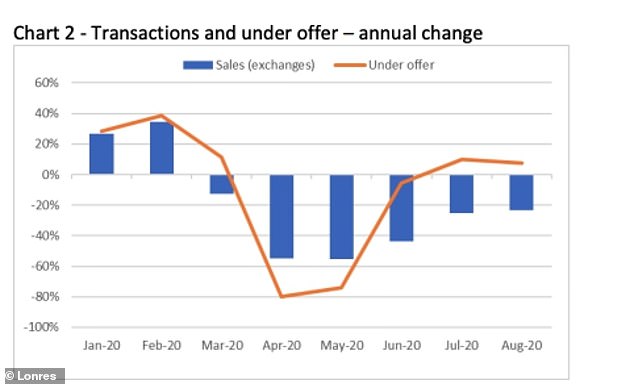Renters race to the suburbs: Bigger homes in commuter towns and villages are on trend as 34% of tenants demand more space
- More tenants ditch city living in favour of living in commuter towns and villages
- Between May and August 2020, 34% of tenants wanted at least one more room
- Upsizing costs more with tenants who do so paying £149 more per month
- LonRes survey also found that space and gardens are in demand among buyers
Landlords offering bigger rental properties in the countryside have become more sought after as tenants are now increasingly seeking to upsize properties in quieter neighbourhoods.
Between May and August, just over a third (34 per cent) of tenants moving home demanded at least one extra bedroom to their property. This is sharply up from the 25 per cent who did so in the first three months of the year, a survey by Hamptons International, a luxury estate and letting agent, has found.
The shift in renting preferences mirrors a similar ‘race to suburbia’ trend seen in the house sales market since the flare up of the coronavirus (Covid-19) crisis in March.

A race for space: Renters and buyers are demanding spacious homes in sought after commuter towns and villages and ditching big city life
Aneisha Beveridge, head of research at Hamptons International, said: ‘Renters have joined home owners in the race for space by rushing to the suburbs where the number of tenants looking to rent is up on last year.’
Hamptons said that across Britain, demand from tenants looking to rent has generally edged up in small towns and suburbs while it has decreased in city locations.
Homes with gardens have also become sought after. Hamptons said a quarter (25 per cent) of rental moves post-lockdown have been from a flat to a house, compared with 16 per cent in the first three months of 2020.
Tenants are also prepared to pay more for space and are typically forking out an extra £149 per month more in rent Hamptons found.
Tenants living in the South East of England are paying the most and have been the most likely to trade up, with 47 per cent of those moving post-lockdown adding at least one bedroom in their move. On average they are spending an additional £266 per month.


LonRes says transactions volumes in prime areas of London continue to recover, with sales recorded in August down 23% on the same month a year ago. This compares to a 25% fall in July and 44% fewer exchanges in June.
Tenants in the North West of England are the next most likely to have upsized, with 37% adding at least one bedroom.
Hamptons also found that nearly two thirds (63 per cent) of London renters upsizing have chosen to leave the capital, helping to ease the additional cost of a bigger home. However, tenants will also need to factor in any commuting costs.
Renters remaining in the capital are benefiting from renters leaving in their droves for commuter towns and villages. It means, the average London-based tenant looking for more space spent £86 per month less, despite gaining at least one extra bedroom.


Usually new instructions in August fall back compared with July. In 2019 there were 30% fewer new instructions in August compared with July. However, this year new instructions in August rose 13% compared with July.
Beveridge added: ‘With tenants’ priorities changing, upsizers have swapped smaller city centre flats for three-bed semis on the fringes of town.
‘While the premium placed on green space is growing each month, upsizing tenants have typically stuck to the outskirts of cities they know rather than leaving altogether.
‘While the race to suburbia has mostly been dominated by tenants in their mid-30s onwards, younger tenants too have an increased appetite for additional space.
For these groups, this typically means moving from a room in a shared house into a studio apartment, or from a studio into a one-bed home with its own separate living and sleeping space.’
| Area | % of tenants who added at least one bedroom | Average % increase in rent per month | Cash increase in rent per mont (£) | |
|---|---|---|---|---|
| South East | 47 | 27 | 266 | |
| North west | 37 | 47 | 301 | |
| London | 33 | -4 | -86 | |
| North East | 32 | 48 | 72 | |
| East Midlands | 29 | 22 | 107 | |
| South West | 28 | 26 | 153 | |
| West Midlands | 27 | 20 | 45 | |
| Scotland | 25 | 22 | 24 | |
| East of England | 24 | 6 | 54 | |
| Wales | 21 | 49 | 242 | |
| Yorkshire and the Humber | 18 | 16 | 16 | |
| Source: LonRes; correct as at 14 September 2020 | ||||
Beveridge said that demand from new tenants also remains below last year’s levels across most of the country, ‘with those choosing to move and take on higher rents less likely to have been affected by the economic crisis’.
The Hamptons International lettings index uses data from the Countrywide Group. The index is based on the 90,000 homes let and managed by Countrywide in each year.
Space – top priority for buyers too
Many recent reports on the house sales market have indicated that buyers are looking for more spacious properties, often in less populated locations outside of cities, as they expect to spend more time working from home in future.
One such report analysing the London housing market issued by LonRes today shows that the prime residential sales market has remained resilient thanks to the ‘space race’.
It revealed that new instructions almost doubled across prime areas of London in August (up 97 per cent) compared to the same period a year ago. The number of properties going under offer recovered in August with an annual eight per cent increase following a 10 per cent rise in July.
However, the analysis by LondonRes show that the number of transaction volumes are still recovering and remain 23 per cent lower than in August 2019.
Homes that have extra bedrooms or gardens with outbuildings that can be used as a work from home space are in particular demand.
Marcus Dixon, head of research at LonRes said: ‘The pace at which the housing market has recovered across the UK has taken many by surprise.
‘Stamp duty incentives do play their part, but for many it appears the main driver has been the desire to change where they live, whether that be moving to a new area or simply adding a bedroom or garden to their wish list.
‘Of course, the prime market has its own unique challenges.
‘Agents are reporting fewer overseas buyers and corporate relocations, both of which provide a key source of demand for prime London homes.
‘Add into the mix the well-publicised escape to the country and many were concerned as to how central London would fare.
‘But the summer sales market has been surprisingly busy, with prices rising and more properties going under offer.
‘We had hoped to report an annual increase in transactions in August, but a longer period between offer and exchange means it may be that we have to wait another month or two yet.’
